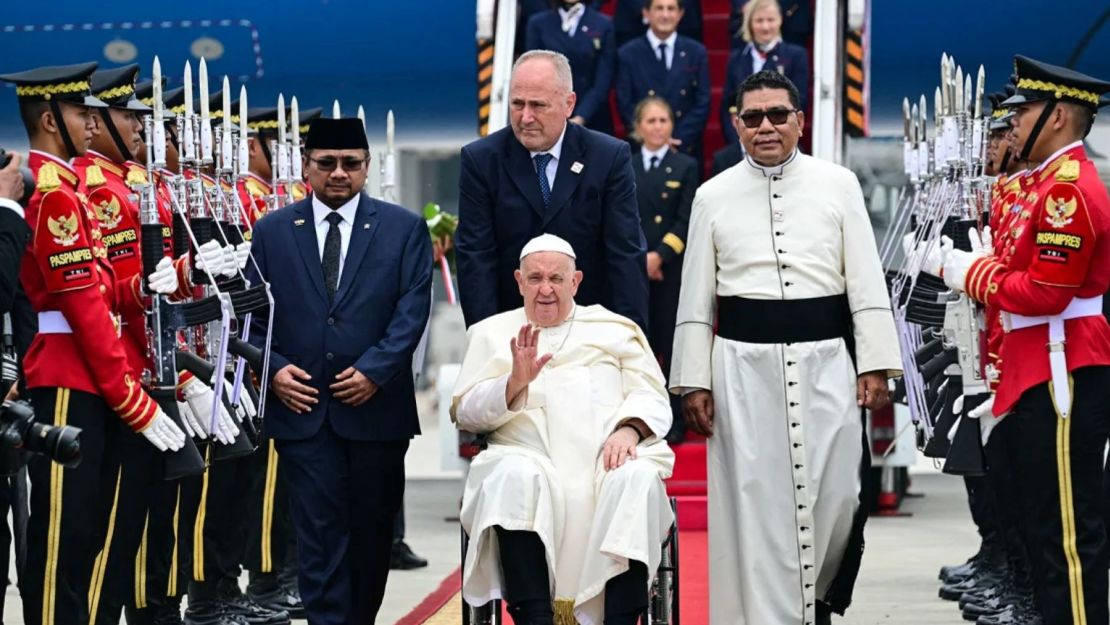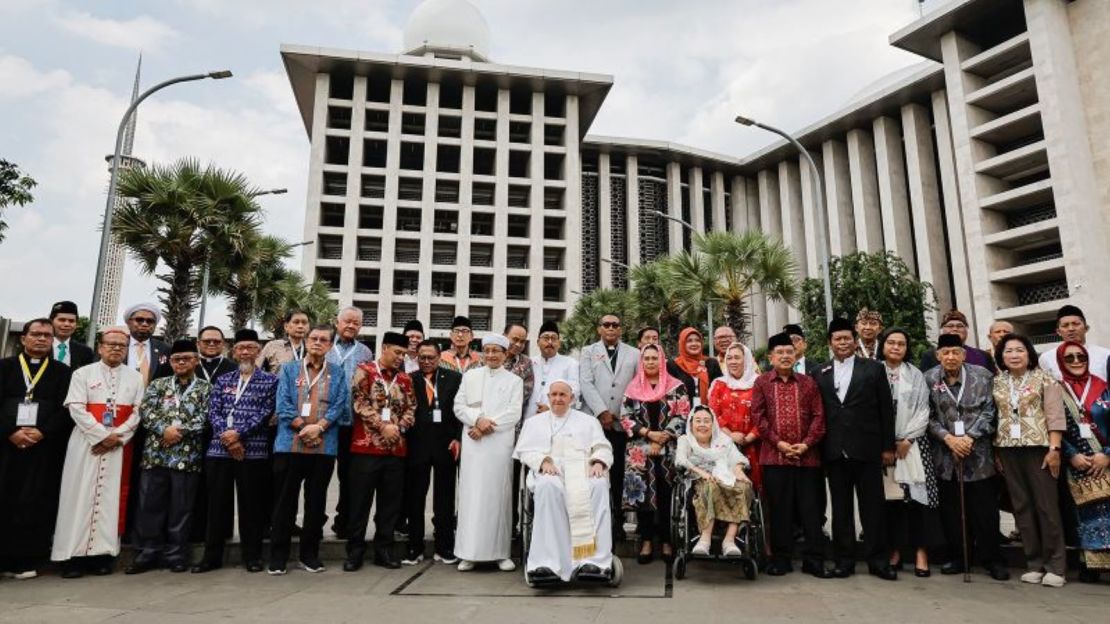() – During his visit to the largest mosque in Southeast Asia, Pope Francis said that the fight against climate change and religious extremism are a common cause.
Since the beginning of his pontificate in 2013, Pope Francis has signaled his intention to build bridges with other religions. The global growth of Islam and the rise of extremism across religions have also made it an urgent priority.
This Thursday, at the largest mosque in the nation with the largest number of Muslims in the world, the pontiff used a joint statement with the grand imam of Indonesia to highlight “two serious crises” facing the world: dehumanization and climate change.
“The global phenomenon of dehumanization is especially characterized by widespread violence and conflict, which often causes an alarming number of victims,” reads the Joint Istiqlal Declaration, also signed by the Grand Imam of Indonesia, Nasaruddin Umar, in the capital, Jakarta.
“It is especially worrying that religion is often instrumentalized in this sense, causing suffering to many people, especially women, children and the elderly,” the statement continued.
“The role of religion, however, must include the promotion and safeguarding of the dignity of all human life.”
On climate change, the declaration stated that “human exploitation of creation” had generated “various destructive consequences, such as natural disasters, global warming and unpredictable weather patterns,” and an “obstacle to the harmonious coexistence of peoples.”
Francis arrived at the Istiqlal mosque, the largest in Southeast Asia, on Thursday morning local time, passing through streets packed with supporters in a metropolis that is one of the fastest sinking in the world. This concern has sparked a controversial and expensive plan to completely relocate Indonesia’s capital.
Located next to the city’s Catholic cathedral, the pope also visited an underground passage known as the “tunnel of friendship,” which connects both places of worship.
As part of the event, the pope also listened to Islamic prayers recited by a young blind woman named Syakila, winner of a national Quran recitation contest.
Francis’ trip to Indonesia and signing of the declaration are in line with his approach to building bridges. But although about 87% of Indonesia’s 280 million people practice Islam, the visit also puts the spotlight on its 8.6 million Catholics and other minorities.
Their arrival in the archipelago “is good news for us, something that reinforces our faith,” declared Father Hieronymus Sridanto Ariwobo, a Catholic priest from Jakarta.
“And secondly, the pope will come here as a symbol of the relationship between Christians and Muslims here in the country.”
Historically, the country’s form of Islam has been moderate and syncretic, often coexisting comfortably with animist and other pre-Islamic practices, while the country’s state ideology, known as “Pancasila,” promotes religious freedom and social justice.
“Indonesia is a great country, a mosaic of cultures, ethnicities and religious traditions, a rich diversity, which is also reflected in the varied ecosystem,” Francis said during the interreligious meeting this Thursday, which the pontiff held in a wheelchair. “Let no one succumb to the charm of fundamentalism and violence.”
The 87-year-old pontiff is making the longest trip of his pontificate, despite the health problems he faces and having begun to use a wheelchair in recent years.

A mass is scheduled to be celebrated this Thursday at the National Stadium in Jakarta, which is expected to be attended by around 80,000 people.
The next day he will leave for Papua New Guinea, the second leg of a marathon 12-day visit to four countries in Southeast Asia and the South Pacific, which also includes East Timor and Singapore.
Indonesia is a symbolically strong option for the kind of ecumenical approach that Francis has embraced.
In the 13th century, traders from Arabia, Gujarat and China arrived in what is now Indonesia, buying cloves, cinnamon and nutmeg. Some of these spice traders also brought Islam with them, and as some settled on the islands of Java and Sumatra, the religion mixed with local animist beliefs.
Christianity arrived in Indonesia with Portuguese traders more than 200 years later, mainly to the eastern islands of Maluku and Timor. The Jesuit missionary St. Francis Xavier worked in the Maluku Islands, but by the end of the 17th century the Dutch East India Company had expelled all Catholic missionaries.
Following the Japanese occupation during World War II, nationalist leaders Sukarno and Mohammad Hatta declared Indonesian independence in 1945. Muslims and Christians have coexisted in Indonesia for decades since its modern founding, and most of its Islamic believers are generally moderate. and syncretic.
However, there have been occasional episodes of religious tension. In 2021two suicide bombers attacked the Sacred Heart Cathedral in Makassar, on the Indonesian island of Sulawesi, during a Palm Sunday mass, wounding at least 14 people. In 2018at least seven people were killed in three attacks on churches in Indonesia on the same day.
Religious minorities have sometimes faced attacks by noisy Islamic extremist groups. Some parts of Indonesia are more conservative, such as the province of Aceh, which practices strict Islamic laws.
“Indonesia [es] as a huge laboratory to experiment with a different type of Islam, a different type of democracy,” declared Ulil Abshar Abdalla, leader of Nahdlatul Ulama, the largest Islamic organization in the country.
Milawati, a Catholic who like many Indonesians uses one name, said she hopes the pope’s visit will send a message to her countrymen to “live a life of mutual love, respect and tolerance among other religions,” so that the country can progress.

“As Catholics, we consider that all religions have the same objective: to live a good and righteous life and believe in God the creator,” he said.
And Elia Dimas Indahputro, a 47-year-old sound engineer, said the importance of religion is sometimes exaggerated in some parts of Indonesia, adding that mixing between people of different faiths is common.
“Even my wife has a different religion; “She is Muslim, while I am Catholic,” he told .
Francis’ visit to Indonesia follows trips to other Muslim-majority countries such as Egypt, Morocco and the United Arab Emirates, the latter being the first in which a pope travels to the Arabian Peninsula. While in Abu Dhabi in 2019, he signed a historic declaration on interfaith cooperation with the Grand Imam of Al-Azhar, Sheikh Ahmed al-Tayeb, the top Sunni Muslim leader.













Add Comment